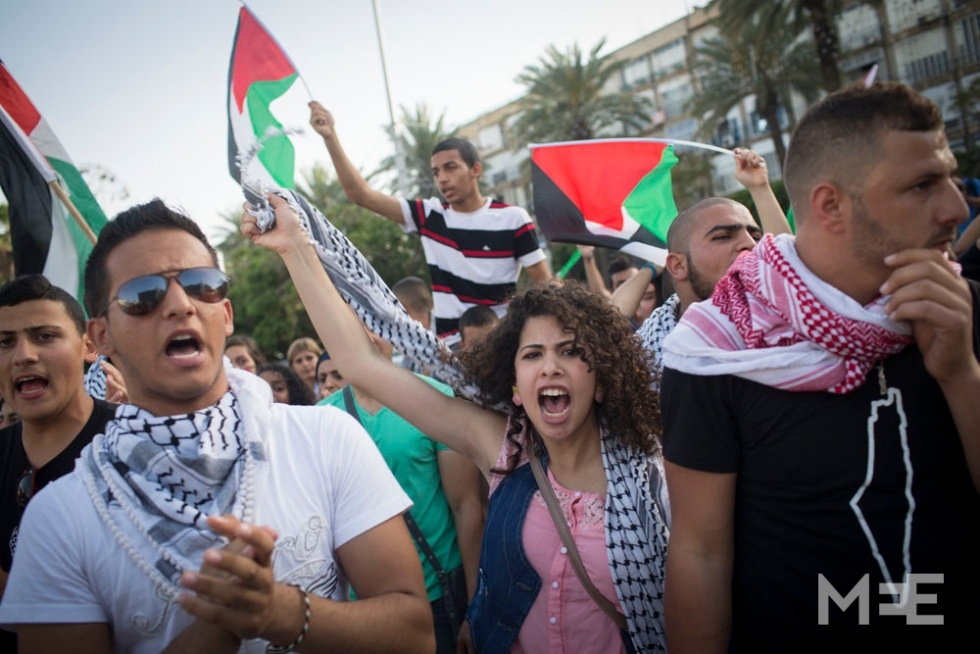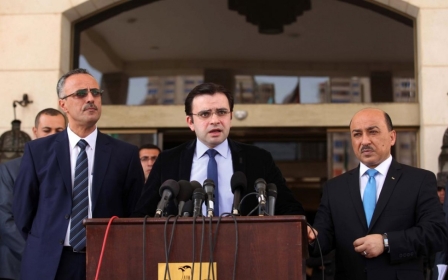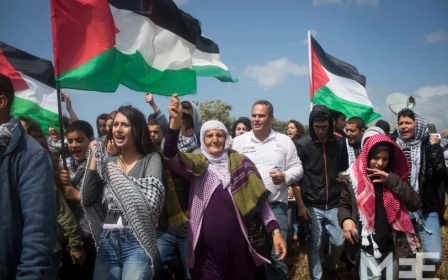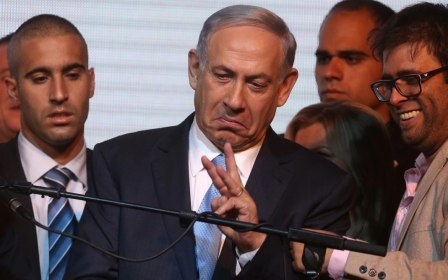More than 1,000 Palestinian citizens of Israel protest house demolitions

An estimated 2,000 Palestinian citizens of Israel demonstrated in Tel Aviv on Tuesday against a wave of house demolitions, capping a day in which Arab shops, schools and businesses observed a general strike.
It was the first time Palestinian citizens of Israel organised a mass demonstration addressed directly to the Jewish citizens in Israel. Protests are usually held in villages where Palestinian citizens of Israel live, out of view of the Jewish public.
"Today we unite, Palestinians from the Galilee, from the Negev, from mixed cities, in order to get to the heart of Tel Aviv, to raise our voice," Botania, an activist from the city of Lod, told MEE. "When we protest near our demolished houses, nobody sees us."
Palestinian citizens of Israel had been striking across the country since the morning in protest at demolitions of their homes, especially in Jerusalem.
The protest and strikes were sparked by recent home demolitions in Kfar Kana in the north, Dahmash near the city of Lod and in the Negev.
They also come at a time of perceived growing racism against Palestinian citizens of Israel, after the 17 March Israeli elections in which Prime Minister Benjamin Netanyahu urged his supporters ot turn out because Palestinian citizens of Israel were going to the polls "in droves".
"This is the first time in history that we decide to hold a protest not inside the Arab villages," Ayman Odeh, head of the Joint List political party, told MEE during the protest. "We want to deliver our voice to the Jewish public and we hope we can find partners among them because what is really good for the Arab public is also good for the Jewish public in Israel."
Gadi Algazi, from Tarabut, a joint Palestinian-Jewish social movement for political change, thanked the crowd for "bringing the struggle for equality to Tel Aviv, and also in my name as a Jewish citizen, that have many privileges in the country.
"I saw in my life too many demolished homes, in Al Arakib, in Jaffa, in Tiybe, and the first demolished home that I saw in 1977 in Majdel Krum," Algazi said. "The Israeli government does not speak with the Arab citizens. They speak with bulldozers. This is the only language they speak with the native people of this land. We have to say today - this will not pass. For every home they demolish, we will build a new one."
In Israel, most villages and towns where Palestinian citizens of Israel live do not have general planing programmes, and it is almost impossible to get a permit to build a new house.
This is why many Palestinians in Israel are forced to build their homes without permit, leaving them liable to demolition.
Hundreds of houses are demolished every year, many in the unrecognised Bedouin villages of the Negev. Although Palestinian citizens of Israel make up some 17 percent of the population, they build only 4.6 percent of new homes, according to Arab rights group Adalah.
In a February report, Adalah blamed the housing crisis on a "deliberate, consistent and systematic government policy" that gives preference to development in Jewish areas over those of Palestinian citizens of Israel.
In 2014, the Israel Land Authority published tenders for construction of 38,261 housing units in Jewish communities compared with only 1,844 in the communities of Palestinian citizens of Israel, the report said.
Dov Khanin from the Hadash party told MEE: "The Arab public in Israel will not stand alone during its struggle for equality. If we want to build a future in this place, we need to create justice in this place.
"This is our challenge, to make the other public in the Jewish society join this struggle, and this is why it is so important to protest here today."
At the rally, a small number of Jewish Israelis could be seen holding up Israeli flags, jeering at protesters, but there was no confrontation.
New MEE newsletter: Jerusalem Dispatch
Sign up to get the latest insights and analysis on Israel-Palestine, alongside Turkey Unpacked and other MEE newsletters
Middle East Eye delivers independent and unrivalled coverage and analysis of the Middle East, North Africa and beyond. To learn more about republishing this content and the associated fees, please fill out this form. More about MEE can be found here.




